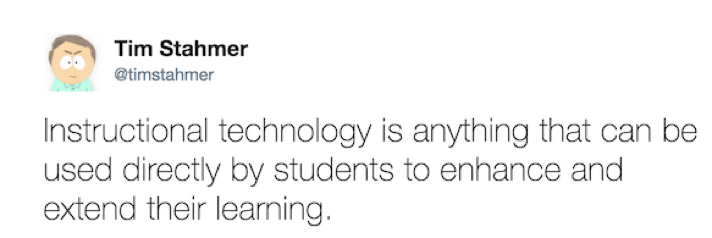Members of the VSTE Board of Directors will be taking time to periodically share their ideas and passions with the VSTE membership. In this post, Board Member Tim Stahmer muses on the meaning of instructional technology.
A primary mission of VSTE is, of course, to help empower educators to make great use of technology for teaching and learning. Many of our members even have “instructional technology”, or some variation on the phrase, in their job title.
But what exactly is “instructional” technology? As opposed to another variety of tech, like the 1977 Ford Pinto.
Ask around and you'll probably get many different answers to that question, but, since this is my post, here is my twitter-length definition:
That would exclude the student information system many teachers use every day. Certainly the online grade book, attendance system, and other tools in most SIS packages is an essential part of classroom management. But it’s not used by students in any part of their learning.
We also drop the learning management system (LMS) many districts provide for their teachers. Think Blackboard, Edmodo, or Google Classroom. Also not “instructional” technology.
I suppose you could make the case that students might use parts of some LMS directly for their learning (a blogging tool, for example). But that’s not how they are commonly used. Most LMS function as organizational and distribution systems for content pushed to students, again to improve classroom management.
Also not “instructional”: response tools (Kahoot, Socrative), interactive whiteboards, video tutorials (Khan Academy), and a long, long list of curriculum games. Although I’ve seen a few (very few) special cases, student interaction with these resources is almost always as consumers, responding to material provided by publishers and teachers, not using them as creators.
And for me, that is the fundamental component for any technology to be considered instructional: control. When I say “directly by students”, I expect them to have some meaningful control as to how the technology - device, software, website, whatever - is used in the learning process.
So, what would I consider some examples of “instructional” technology?
That word processing program most students use would count, but only if they have some decision about what they will write. It would be even better if their writing was connected to the web, allowing them to present their ideas to a larger, more meaningful audience. One without a red pen.
We could include one of those slide show presentation programs, but only if the student has some control over the content. And again, let’s extend that control and let them determine the tools that will allow them to best explain their ideas to an audience beyond the walls of their classroom.
Then there are the devices that many students bring to school everyday, the ones that too many of their teachers still consider as the antithesis of “instructional”. Beyond providing access to vast amounts of information, those so-called phones are also powerful creative tools that can be used to record, edit, and distribute still images, audio, and video. Tools students can use in many, many ways to communicate their thoughts, ideas, and learning.
Of course, all of the above is only my opinion. But what do you think? How would you define "instructional technology" (or it’s shorter, equally vague sibling “edtech”)? Tweet your ideas to @timstahmer and @vste and let’s have that conversation. Or post a longer comment to this post on my blog.
Because in the end, the terminology we use when discussing these issues - with our colleagues, the community, legislators - does matter. We must be very clear when advocating for the use of technology in our schools and why it makes a difference for students.
Tim has been helping educators make better use of technology for teaching and learning at his website AssortedStuff since the turn of the century. He also loves to connect with interesting people on Twitter and is a member of the VSTE Board of Directors and serves on the conference committee.


